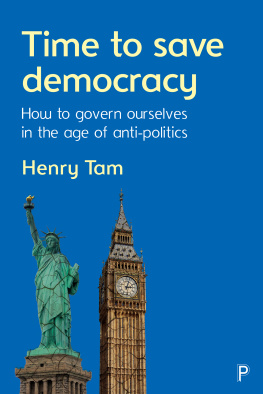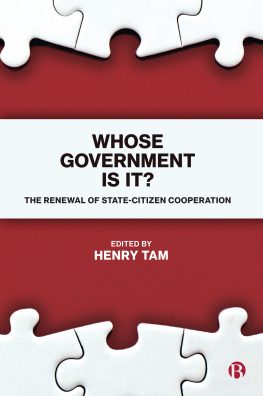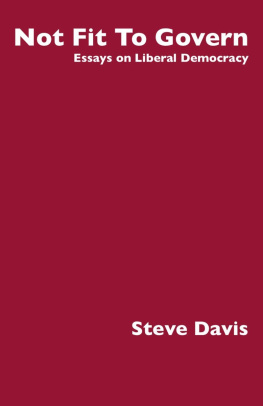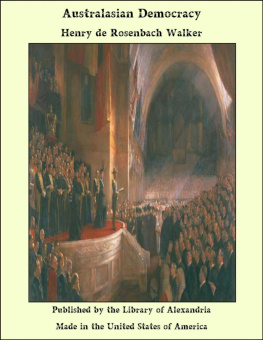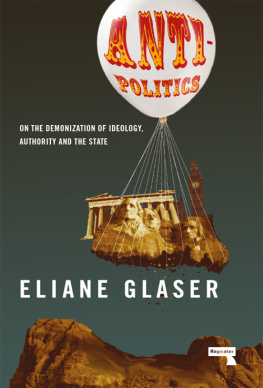
First published in Great Britain in 2018 by
Policy Press University of Bristol 1-9 Old Park Hill Bristol BS2 8BB UK Tel +44 (0)117 954 5940 e-mail
North American office: Policy Press c/o The University of Chicago Press 1427 East 60th Street Chicago, IL 60637, USA t: +1 773 702 7700 f: +1 773-702-9756 e:
Policy Press 2018
British Library Cataloguing in Publication Data
A catalogue record for this book is available from the British Library.
Library of Congress Cataloging-in-Publication Data
A catalog record for this book has been requested.
ISBN 978-1-4473-3824-6 (paperback)
ISBN 978-1-4473-3826-0 (ePub)
ISBN 978-1-4473-3827-7 (Kindle)
ISBN 978-1-4473-3825-3 (ePDF)
The right of Henry Tam to be identified as author of this work has been asserted by him in accordance with the 1988 Copyright, Designs and Patents Act.
All rights reserved: no part of this publication may be reproduced, stored in a retrieval system, or transmitted in any form or by any means, electronic, mechanical, photocopying, recording, or otherwise without the prior permission of Policy Press.
The statements and opinions contained within this publication are solely those of the author and not of The University of Bristol or Policy Press. The University of Bristol and Policy Press disclaim responsibility for any injury to persons or property resulting from any material published in this publication.
Policy Press works to counter discrimination on grounds of gender, race, disability, age and sexuality.
Cover design by Hayes Design
Front cover: image kindly supplied by Hayes Design
Readers Guide
This book has been optimised for PDA.
Tables may have been presented to accommodate this devices limitations.
Image presentation is limited by this devices limitations.
Contents
The more time one spends on finding ways to deal with political challenges, the more indebted one becomes to the numerous colleagues who have helped over the years. With the ideas developed in this book, covering the related fields of deliberative democracy, participatory government, civic republicanism, communitarianism, and citizen politics, I have benefited from countless conversations, seminars, and exchanges of writings, involving so many leading social and political thinkers. Long may these stimulating interactions continue, though alas, they will be forthcoming no more with those who have left us Bernard Crick, Bob Bellah, Philip Selznick, and Ben Barber, to name but four in the last decade.
I have also been most fortunate in having the chance to explore new thinking on democratic governance with others during my time as Visiting Professor of Lifelong Learning at Birkbeck College, London; Director of the Forum for Youth Participation & Democracy at the University of Cambridge; and the lead for classes on politics and government with institutions from the Workers Educational Association to the Civil Service College. For these opportunities, I remain grateful to John Annette, Diane Reay, Hilary Cremin, Phil Coward, Sharon Watson, and Sonny Leong.
One other major source of learning for me has been the experience in heading up a number of government policy divisions in the Home Office, and in the Department for Communities & Local Government. As the Head of Civil Renewal in particular, with a key remit to improve the engagement with citizens and communities in reviewing and shaping public policies, I gained first-hand knowledge of the practical impact of a variety of ideas for democratic reforms. To my colleagues in Whitehall and the many community and local government partners I had the pleasure of working with, I want to extend my heartfelt thanks.
From exploring the initial concept of this book with Alison Shaw, to taking the project forward with the support of Emily Watt, Jamie Askew, Ruth Wallace, Susannah Emery and others at Policy Press, it was everything a writer could ask for from a top publishing team.
Finally, since any well-observed truth is worth repeating, let it be said, without Celia, none of this, not one word of it, would have been possible.
Introduction:
Democracy in distress
To govern or not to govern ourselves? That is the ultimate political question. Can we afford to risk having no government, thus allowing the unscrupulous to take advantage of others? Or dare we leave our fate in the hands of arbitrary rulers, when so many of them throughout history have turned out to be clueless, capricious, or simply self-serving?
Democracy is supposed to offer us a way out, so we can take charge of our own destiny and govern the institutions, neighbourhoods, cities, and countries to which we belong. Whether we make the decision on any given issue by ourselves directly, delegate it to a subgroup, or elect representatives to deal with it, democracy is meant to give us a framework to shape our own governance.
The symptoms
So why is despair in the air? Amid the widespread talk of our entering the age of anti-politics, is the idea that we can govern ourselves actually a hopeless pipe dream? At one level, the symptoms are indeed worrying. Research published in 2016 found that over 70% of people born in the US and UK in the 1930s believed it was essential to live in a democracy, but barely 30% of those born in those countries in the 1980s share that view (Taub, 2016). Previously, from the early 20th century on, when universal suffrage was secured in most Western, developed countries, citizens had looked to one or another established political party to take their concerns into account and put forward a programme that could command the majority support of the electorate so as to become the basis of how their country would be run until the next election. But from the late 1970s, four notable trends can be discerned.
First, the extent to which people identify with a major political party has steadily declined. In all European countries (bar Austria, Cyprus, and Finland), the average percentage of the electorate who belong to a political party is just 5%, with both France and the UK under 2% (Van Biezen et al, 2011; Keen & Audickas, 2016). In the US, more Americans now consider themselves independent (42%) than either Democrats (29%) or Republicans (26%) (Jones, 2016). More and more people feel that their views are not necessarily reflected by the outlook of any single party, and they do not feel motivated to support them. While turnout fluctuates over time, the historic high of 84% in the 1950 UK elections is now a distant memory, and in both the UK and the US it is common for around a third of registered voters not to vote at all.
Although it is often suggested that voting should be made easier, or even compulsory, the fact remains that many people do not vote because they have little understanding of the impact of different political parties winning power. Some think that the main parties are so similar that none is worth backing over any other, especially when perception is coloured by news reports about politicians behaving badly (from over-claiming expenses to receiving questionable donations). Even when the evidence would suggest there are important differences in many policy areas, they can be overlooked unless one side is associated with someone with a radical profile. For example, in the UK, although both Ed Miliband and Jeremy Corbyn had put forward policies that were significantly different from those offered by the Conservative Party (Bush, 2017), it was Corbyn, with his rebel persona, the turnout among Democrat voters actually dropped (Regan, 2016).


